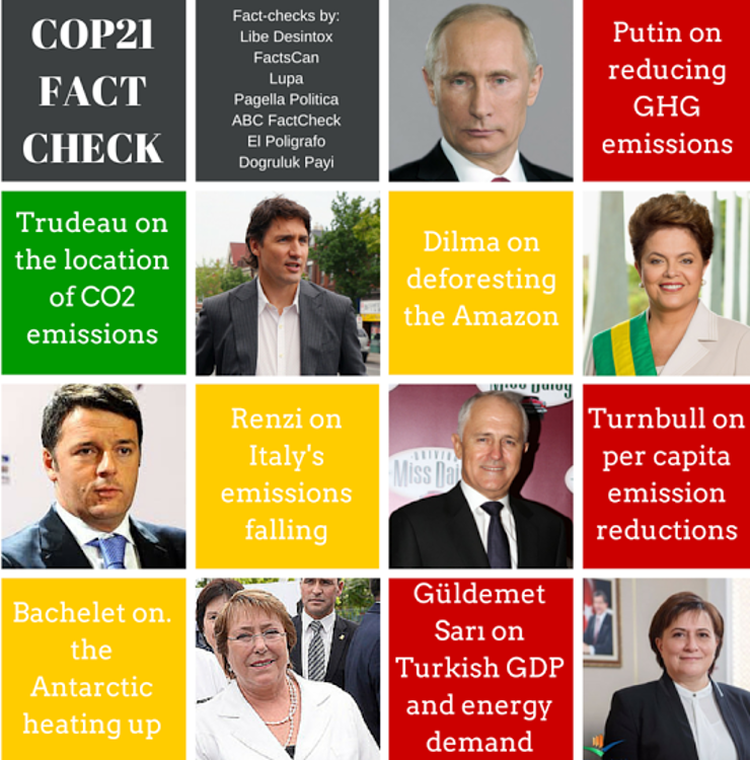Hot Air? World Leaders Fact-Checked During Paris Climate Change Conference

The Paris climate change conference is coming to a close, and observers are reportedly confident some kind of agreement will be reached. As with the G20 summit last month, fact-checkers from across the world scrutinised the claims made by political leaders attending the international jamboree.
Many of the claims dealt with targets each country has put forward to reduce their greenhouse gas emissions or the work they say they’ve already done toward that goal.
Vladimir Putin claimed that Russia has made significant strides toward reducing greenhouses gas emissions since 1991. As French fact-checkers Désintox , official data show there has been a reduction — but there is a catch. These decreases weren’t the result of a specific strategy as much as the consequence of the massive de-industrialisation of the country following the breakdown of the USSR. Moreover, CO2 emissions have been increasing on a per capita basis since 1998.
Matteo Renzi, the prime minister of Italy, pointed at his own country’s falling greenhouses gas emissions, allegedly down 23 percent compared to 1990. Italy’s Pagella Politica found> that his figures are generously rounded up, and the reduction achieved mostly because the Italian economy entered a prolonged recession in 2008.
Malcolm Turnbull, the prime minister of Australia, claimed before the Paris summit that his country’s targets were the second most ambitious in the world after Brazil’s, when measured per capita. As ABC Fact Check notes, at least three other countries actually promised greater reductions.
temperature of 63 degrees doesn’t sound extraordinarily warm – unless you’re in the Antarctic. Michelle Bachelet, the president of Chile, claimed that this temperature was recorded in the Antarctic Peninsula in March. Chilean fact-checkers El Poligrafo, publishing on the daily newspaper El Mercurio, note that while this record-breaking temperature was measured at the Argentine base of La Esperanza, it still needs to be validated by the UN’s World Meteorological Organization.
Defending Canada’s policy of investing in emissions reductions in developing countries, Justin Trudeau, the prime minister of Canada, claimed “the atmosphere doesn’t care where emissions get emitted.” That’s backed by science, say Canadian fact-checkers FactsCan, who note the relatively homogeneous CO2 concentrations measured across the world.
Fatma Güldemet Sarı, Turkey’s minister of environment, noted that her country’s targets were ambitious in light of the 5 percent economic growth and the related 6 percent increase in energy demand that Turkey is experiencing. As local fact-checkers Doğruluk Payı noted, the annual averages for the period between 2000 and 2013 are actually 4.4 percent and 3.8 percent, respectively.
Somewhat more accurate was Dilma Rousseff, the president of Brazil, who claimed the deforestation rate of the Amazon forest has fallen by 80 percent over the past decade. This figure checks out, Brazilian fact-checking agency Lupa writes, even as it is worth noting that in 2014-2015 the area subjected to deforestation went up by 16 percent.
Narendra Modi, the prime minister of India, has set a target for renewable energy generation of 175 gigawatts by 2022. Achieving this would require an investment four times the defence budget, Factchecker.in writes.
This article was first published on Poynter.org.


